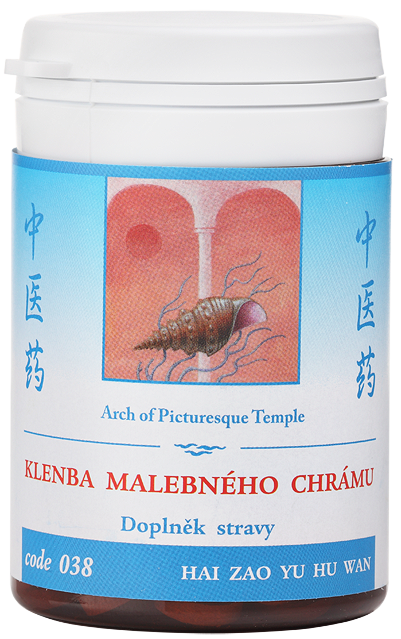
- Dang gui (Chinese Angelica Root)
- Du huo (Pubescent Angelica Root)
- Hai zao (Sargassum)
- Chen pi (Tangerine Peel)
- Chuan xiong (Sichuan Lovage Rhizome)
- Kun bu (Japanese Sea Tangle)
- Lian qiao (Forsythia Fruit)
- Zhe bei mu (Thunberg Fritillaria Bulb)
- Zhi ban xia (Pinellia Rhizome)
- Qing pi (Green Tangerine Peel)
- Hai dai (Japanese Sea Tangle)
- Zhi gan cao (Licorice Root)
- Microcrystalline cellulose (MCC) 1%
Affects based on the TCM:
- Disperses phlegm TAN
- Softens tough
- Reduces and disperses SHI YING (goiter)
- Regulates QI ZHI and disperses blood YU XUE
Usage:
- Enlarged thyroid gland (goiter)
- Cysts or benign thyroid tumours (fibromas)
- Increased thyroid function – hyperthyroidism (hyperthyreosis)
- Swollen mammary glands (during lactation or in children)
Description according to traditional Chinese medicine: This is a modification of the original traditional Chinese herbal mixture HAI ZAO YU HU WAN, adjusted to meet today’s needs. It seems that the typical diseases today are diseases of the thyroid. It was not different in old China. Although much time has elapsed since then, the principle of treatment of an enlarged thyroid according to Chinese medicine remains the same – dissolve the accumulated phlegm TAN (accumulated in the thyroid because of excessive consumption of fatty, greasy, sweet and dairy meals), soften hard spots (in the form of nodules and tumours – fibrous nodular goitre) and stir up the stagnating blood and qi energy in the area of the thyroid to prevent further accumulation, so that the famous “clogged gutter” could once again fulfil its function properly.
To avoid getting out of the frying pan into the fire, it is necessary to comply with a certain lifestyle – e.g. omit fatty, greasy meals, sweets and dairy products and prefer greens and root vegetables, in particular fresh horseradish, spicy radishes and cereals such as Job’s tears (White Pearl from East (code 910) or Beverage of Chinese Sages (code 900)). This herbal mixture was also used in old China whenever we use anticoagulants today to dilute blood (Warfarin, Anopyrin) because its effects are also anticoagulant and antisclerotic as it dilutes phlegm TAN, cools down heat and stirs up blood.
Packaging: 100 tablets / 30 g (100% natural, natural cellulose max. 1% is the only binding agent; made from concentrated herbs at a ratio of 5:1, i.e. 5 g of dried herbs are used per gram of herbal tablets)
Dosage: 3 times daily 4 tablets, children over 3 years of age 3 times daily 2 tablets
More information about dosage and using herbal tablets.
Click here to search where to buy HAI ZAO YU HU WAN on Google

- Dang gui (Chinese Angelica Root)
- Du huo (Pubescent Angelica Root)
- Hai zao (Sargassum)
- Chen pi (Tangerine Peel)
- Chuan xiong (Sichuan Lovage Rhizome)
- Kun bu (Japanese Sea Tangle)
- Lian qiao (Forsythia Fruit)
- Zhe bei mu (Thunberg Fritillaria Bulb)
- Zhi ban xia (Pinellia Rhizome)
- Qing pi (Green Tangerine Peel)
- Hai dai (Japanese Sea Tangle)
- Zhi gan cao (Licorice Root)
- Microcrystalline cellulose (MCC) 1%
Each batch of our herbal products is tested in the accredited Phytax laboratory for medicines in Schlieren (Switzerland). This testing identifies herbs, but also heavy metals (mercury, cadmium, lead, arsenic, and copper), bacteria (E. coli, salmonella, total number of bacteria), mould, yeasts and aflatoxins. TCM Herbs is the only supplier in Europe that tests each batch of herbs for all its herbal tablets. Among other things, the herbal products are tested for 511 types of pesticides (4 groups). This is because pesticides have become a worldwide problem, especially in products from the so-called third world. Customers buy herbal products in the belief that they are completely natural, but often these products are “contaminated” with other undesirable “chemicals”.
The herbal tablets and beverages from our company (TCM Herbs) are the only ones in Europe to have been additionally tested. Among others, our products are tested for 511 pesticides — and this number is continuously increasing due to the use of new pesticides. Pesticides are now becoming a global problem! Such a range of checks on pesticides cannot even be detected in laboratories in Europe. Neither is anyone testing it, because unfortunately European legislation does not require these examinations. This comprehensive testing of each batch, and each herb beyond the normal examinations does require considerable financial costs, but the quality of herbs and safety of our products is our absolute priority.
Laboratories are different
A certified laboratory for food supplements is obliged to examine the presence of heavy metals, fungi, and bacteria. However it only determines a smaller range of pesticides and its requirements for their quality content in herbs are lower.
On the other hand, a certified laboratory for medicines also identifies individual herbs and, in particular, tests the entire range of pesticides (at least 500 types) and has higher requirements for the quality in herbs. In the EU, there are only a few laboratories like that and the prices for their services are rightly high. Today, it is therefore very important to know which laboratory tests the dietary supplement and what the tests are focused on; if each batch and each herb are tested, or just a random sample, for how many pesticides, how many added ingredients and how many additional binding agents the product contains, etc. – otherwise consumers could be easily deceived and disappointed (you can find more details at Safety and Quality of TCM Herbs Products).
All our herbal products are tested in a certified laboratory for medicines.
The above information implies that herbal tablets and drinks of TCM Herbs are, in terms of quantity (concentration of herbs in the mixture is 5 times higher, i.e. 1 g of a herbal tablet equals 5 g of raw herbs) and quality (unprecedented testing of each batch), among the best products we can imagine and enjoy in terms of today’s natural medicines.


